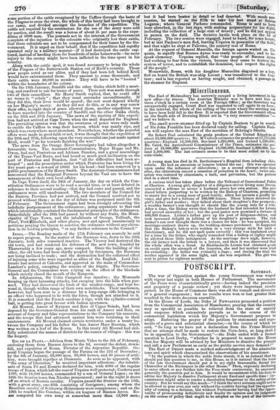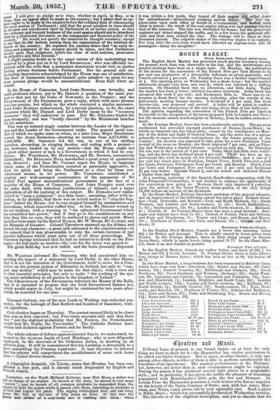POSTSCRIPT.
SATURDAY.
The war of Opposition against the young Government was waged with vigour last night in both Houses of Parliament. The movements of the Peers were characteristically grave—having indeed the precision and propriety of a parade review ; yet there were important results gained. In the House of Commons there was all the tumult and diversity of a general engagement ; but no results were won or lost greater than resulted in the more decorous assembly.
In the House of Lords, the Duke of NEWCASTLE presented a petition from the Commercial Association of Manchester, praying that the country may as speedily as possible be relieved from the state of anxiety and suspense which extensively prevails as to the course of the commercial legislation which her Majesty's Government proposes to adopt. Enforcing the prayer of the petition by statements and argu- ments of a grave and substantial character,—in the course of which he said, "So long as we have not a declaration from the Prime Minister that no attempt shall be made to restore the Corn-laws, so long shall I be in opposition to the Government,"—the Duke ended with a formal question to Lord Derby, "whether he is prepared to assure the House that.ber Majesty will be advised by her Ministers to dissolve the present and Call a new Parliament as early as the public service may demand ?"
The Earl of DRAW made a marked acknowledgment of the admirable tone and spirit which characterized the observations of his questioner.
"In the position in which the noble Duke stands, it is as natural that he should put this question to me, in this House, as it is natural that the head of the late Government should put it to my right honourable friend the Chancellor of the Exchequer in the other House." Then, expressly declining to enter afresh or any further into the Free-trade controversy, he answered generally the question put to him. It would be inconsistent with his dutyto advise her Majesty to dissolve Parliament at any fixed and specific time cir- cumstances might arise to render a dissolution dangerous to the safety of the country. But he would say this much—" I think the next autumn ought not to be allowed to peas over, not only without the country having had the opportu- nity of coming to a decision, but without Parliament having had the oppor- tunity of pronouncing definitively and finally its opinion and its judgment on the course of policy that ought to be adopted on the part of the Govern' ent. I will give no pledge as to time, whether in April, in May, or in run; that an appeal shall be made to the country ; but I admit that an ap- peal ought to be made to the country before the ordinary time of commencing the next session of Parliament; and that the great question in issue should he decided and adjudicated upon by Parliament at an earlier period, so that the ordinary and current business of the next session should not be interfered with by a protracted discussion on the commercial and financial policy of the country." He "mild not specify the measures he thought necessary, except say that he did include among them the organization of the internal de- fences of the country. He repeated his anxious desire that "an early de- cision and judgment of the country should be taken, and that Parliament should upon that ju ent, before the close of next autumn, pronounce its definitive and final •easion." A slight passing doubt as to the exact nature of this undertaking was inspired by a gloss put on it by Lord REDESDALE ; who was officially im- pressed with the evils that a premature dissolution would visit on parties having private business before Parliament. But the general and un- hesitating impression acknowledged by the House was one of satisfaction. The Earl of ABERDEEN declared himself quite satisfied—to press for any mere precise pledge would be unconstitutional. Even Earl Gsmv as- sented.
In the House of Commons, Lord Joss Rossurm rose formally, and amid profound silence, put to Mr. Disraeli a question of the same pur- port to that put by the Duke of Newcastle to the Premier ; and the Criarscwszon of the EXCHEQUER gave a reply, which with more phrases was less precise, but which on the whole conveyed a similar assurance. Lord Joss RUSSELL endeavoured, by a second question, to fix the exact measures which Mr. Disraeli and Lord Derby mean by the "necessary measures" they will endeavour to pass. But Mr. DISRAELI fended the pass brusquely, and was "loudly cheered" by the Ministerial benches for his smartness.
This was an isolated single combat between the Leader of the Opposi- tion and the Leader of the Government ranks. The general party con- flict of which we spoke came on when, at a later hour, Major BIERRSPORD moved the Army Estimates—showing an increase from 3,873,6661. to 3,986,3081. 11r. OSBORNE led the van, in one of his rattling speeches, abounding in stinging facelifts, and ending with a protest— not, however, backed up by any motion—that the House ought not to grant either money or men to a Government in which it had no con- fidence. Mr. WHITESIDE, Mr. Haws-ELL, and Mr. BOOM?, successively skirmished ; Sir BENSARIN HALL marshalled a great array of quotations from Hansard; and then Mr. COBDEN urged the House, in language which some of the Protectionists resented as personally aggressive, to show its spirit, and bring the Parliament to a close by those con- stitutional means in its power. Mr. CARDWELL contributed a weighty and well-arranged condensation of the arguments of Sir Robert Peel against unconstitutional government in the face of a majority of the House of Commons. Lord Joss Russraz went over the same field, with historical justifications of himself, and a larger application of all the learning of this subject. Mr. Manama now endea- voured to "snap a judgment " on a false issue ; assuming, either with in- tention, or by mistake, that there was an actual motion to "stop the Sup- plies" before the House : but he was stopped himself by exclamations and corrections, which somewhat ruffled him. At last, Mr. BRIGHT wound up the set orations, with a warning to "the ephemeral Government which has scrambled into power," that if they go to the constituencies on any duty they like on corn, they will be scattered to pieces and perish. Minor speeches were made bythe Earlof MARCH, Mr. W. Mims, Mr. CATLET, and the Marquis of GRANBY. Colonel Tsosirsos summed up the debate, and hinted its real character—a great talk addressed to the constituencies—in the remark that it was pleasureable to note the certain increase of just popular influence which must arise out of all these proceedings. Mr. OSBORNE having intimated that he had no intention to divide on the Esti- mates—he had made no motion—the vote for the Army was agreed to.
The great field-day was now ended, and the hosts presently dispersed.
Mr. WALPOLE informed Mr. Osmium, who had questioned him re- specting the import of a statement by Lord Derby in the other Efonse, that it is not the intention of the Government itself to move for a Com- mittee on the present system of Education in Ireland, but only to "sup- port any motion" which may be made for that object, with a view not to alter essential principles, but only to make "the working of the sys- tem more satisfactory to all parties in the kingdom of Ireland." The Cmusairmsan of the EXCHEQUER informed the Master of the Rolls, that it is intended to propose that the Irish Encumbered Estates Act, which would expire in July, but might be continued for two years after- wards, be renewed for one year.



























 Previous page
Previous page